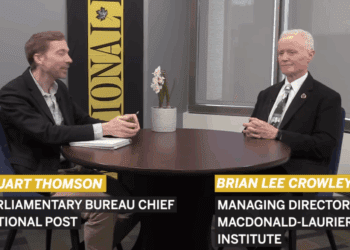Writing in the Globe and Mail, Macdonald-Laurier Institute Managing Director Brian Lee  Crowley says the upcoming provincial budget in Quebec is an important one for the province.
Crowley says the upcoming provincial budget in Quebec is an important one for the province.
The provincial economy has stagnated under years of government overspending, he writes. Now it’s time for Quebec to gets its finances right – just like the federal government did under former finance minister Paul Martin in 1995.
By Brian Lee Crowley, March 6, 2015
The most important budget this spring won’t be tabled in Ottawa or Edmonton but Quebec City. In fact this may not only be the budget of the year, but of the decade, matched in recent memory only by Paul Martin’s epoch-making 1995 document.
In fact this year’s Quebec budget and Paul Martin’s in 1995 are linked in the great sweep of history. Starting in the 1960s Ottawa and Quebec became embroiled in a political struggle born of the rise of a separatist Quebec nationalism. Both sides saw themselves engaged in an existential struggle. Quebec City, whatever the party in power, was building a Quebec nation endowed with all the instruments of statehood. Nor was it only the PQ that brandished separation to get their way. Liberal Premier Robert Bourassa wasn’t above threatening sovereignty votes when it suited him.
Ottawa naturally reacted as if its life was at stake, as indeed it was. But in our polite, bloodless, rather technocratic way, the weapon of choice in this Canadian duel was government spending. We lived through a decades-long bidding war for the support of fickle Quebec voters who were past masters at pitting the two governments at each other’s throats. How else to understand the big majorities la belle province could award almost simultaneously to Pierre Trudeau and René Lévesque?
While each government was happy to spend heedlessly, neither was prepared to raise taxes in proportion. Thus began a decades-long experiment with vast expansion of government employment and the welfare state financed principally by borrowing and only secondarily by rising taxation. The result was economic damage nationally, but devastation in Quebec.
Quebec went from level pegging with Ontario in terms of economic growth, investment and job creation to a plodding laggard. Montreal, until the 1960s Canada’s largest metropolitan area, now lags Toronto by roughly 2 million people. Quebec gets the same number of immigrants as BC despite having twice its population. Many of those in Toronto and elsewhere fled Quebec’s unsettled political climate. Quebec has 23 percent of Canada’s population, but something like a mere 16 percent of all private sector workers. The new office tower going up near Montreal’s Bell Centre is apparently the first in the city centre in decades whose construction was not driven by government.
Because expanding the size of government inevitably means more heavily-unionised civil servants trade unions became powerful, egging on an electorate that now saw its prosperity arriving chiefly through government paycheques and transfers rather than private investment and growth.
Unsustainable debt levels twinned with punitive taxation, confrontational labour relations and low levels of workforce participation plus a host of other factors all related to the bidding war for Quebeckers’ votes, have taken their toll.
Mr Martin’s 1995 budget was the day Ottawa bet that the strategy of the previous quarter century had been a mistake; he set about reversing course with a vengeance. Ottawa then controlled 53 percent of GDP. Over the course of the next decade that declined to 42 percent and we quickly balanced the federal budget, ended net borrowing and ushered in a string of surpluses. Economic growth, job creation and investment all took off and the proportion of Canadians living in poverty fell by two fifths. Canada is still reaping the benefits of that volte-face 20 years ago.
Quebec has found it much more difficult to change course. Each debt-fuelled spasm of spending intended to create winning conditions for a referendum was followed by a pause, but it was always a case of reculer pour mieux sauter.
Quebeckers now get that this behaviour has exacted on them a terrible price in terms of lost growth, incomes and opportunities. Quebec politics for the past couple of decades has been dominated by the painful attempts of the political class to find the courage and electoral support to reverse course as Ottawa did. Being more deeply mired in the trap of a state and union dominated economy, however, it has been correspondingly more difficult for the province to extricate itself.
The still-new Liberal government of Philippe Couillard will tell us in its coming budget whether they have the courage to be the saviours that they have promised to be. The signs are good. They made early runs at sacred cows like $7 a day daycare. The ministers of finance and Treasury Board are committed reformers. But if they introduce Quebec’s version of the Paul Martin fiscal slimming plan, the reaction from the unions, students, welfare recipients and others will make the tuition protests that helped bring down Jean Charest look like a lark. This budget and its aftermath will tell us who rules in Quebec: democratically-elected governments, or refuseniks in the street.
Brian Lee Crowley (twitter.com/brianleecrowley) is the Managing Director of the Macdonald-Laurier Institute, an independent non-partisan public policy think tank in Ottawa: www.macdonaldlaurier.ca.




